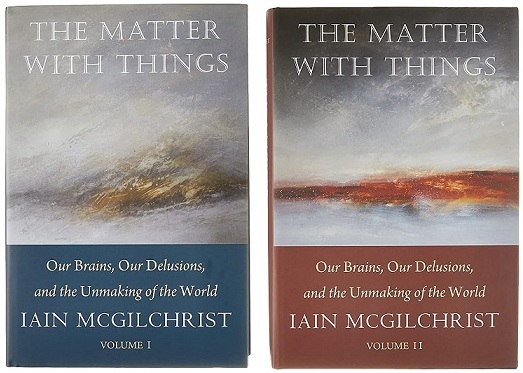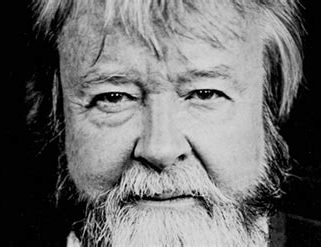|
Word Gems
exploring self-realization, sacred personhood, and full humanity
Consciousness, Mind, Brain
"The current worldview has it that everything is made of matter, and everything can be reduced to the elementary particles of matter; [however,] everything starts with consciousness - consciousness is the ground of all being." Dr. Amit Goswami
|
J.P. Morgan: "A man always has two reasons for the things he does - a good one, and the real one."
Editor’s note: Computer science is a highly technical area and relatively few are able to converse knowledgeably on the abstruse details of the AI debate.
But there’s an underlying issue, easy to understand, the “real reason,” as J.P. Morgan would say, as to why this whole issue is so contentious.
Roger Penrose: Human intelligence "is not a computation," cannot be reduced to an algorithm or formula.
See my essay:
The Underlying, but Unaddressed, Issue Which Energizes the AI Debate
|
Dr. David Hawkins: Levels Of Human Consciousness: Why Is World Peace So Elusive?
Dr. Wilder Penfield's brain research; some of the very best discussion concerning the difference between brain and mind.
See an extensive list of quotations from the quantum-father physicists concerning Consciousness as the basis of reality.
Dr. Amit Goswami: Consciousness as the ground of all being
|
Emily Dickinson and the self-observing consciousness
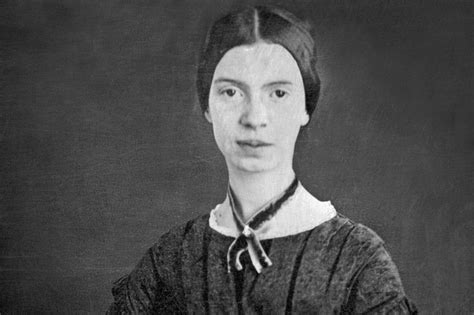
Emily Dickinson (1830-1886)
In a short offering of 67 words, "This Consciousness that is aware," the great poetess speaks 5 times of a Self that perceives "itself."
self-enclosed isolation, attended by its own identity
For all eternity, she says, we are "condemned" to a “self-enclosed isolation” of the Self witnessing to itself. This self-reflecting "friend down inside," Lincoln's phrase, shall be constant companion to our eternal existential journey; or, as per Emily, "attended by its own identity."
self, observing itself, will yet unfold the entire inner person
I have come to see, with concurrence by Krishnamurti, that simply noticing or witnessing one's own self-awareness is the catalyst to eventually unfold the hidden riches of the entire inner person.
READ MORE, Emily's "This Consciousness that is aware"
|
Dr. Rupert Sheldrake: The mind's epicenter is not found in the brain; therefore, consciousness is not extinguished, and continues on, when the physical body fails
Dr. Rupert Sheldrake: Consciousness is a quantum field containing all manner of possibility: developing an internal guidance system for eternal life; a life which begins today.
Dr. Richard Gault: Panpsychism and the Problem of Consciousness
|
'Right now, your consciousness is running on biological hardware, what we call a brain, but consciousness itself isn’t dependent on that specific hardware, any more than a software program is dependent on any single computer.'
"Death isn’t an ending. It’s a transition. Like when you upgrade from one computer operating system to another, all your core data, your essential self, gets migrated to a more advanced platform. The hardware changes, but the software that makes you you continues running.
"Death is essentially consciousness transitioning from biological hardware to something infinitely more sophisticated. And the entity managing this transition, coordinating this massive distributive network of conscious beings, is what we call God."
READ MORE
|
Ralph Waldo Emerson: The Over-Soul
Ralph Waldo Emerson: Self-Reliance
|
'One of the most important books ever published - and, yes, I do mean ever... a devastating assault' on the materialist worldview - Oxford Law professor, Charles Foster, for The Guardian
'[McGilchrist's] claims may turn modern ultra-Darwinists purple, but they cannot easily be dismissed' - Nick Spencer, Prospect magazine
Dr. Iain McGilchrist is a psychiatrist, neurologist, philosopher and writer. His 1600-page seminal work, The Matter with Things (2021), ten years in the making, presents the case that the brain’s left and right hemispheres see and interact with the world in profoundly different ways.
Two hemispheres, two worldviews:
Left-brain sees with tunnel vision, a narrowed focus of things in fragmented isolation, desires to analyze parts, is linear, can be ruthlessly goal-oriented, prefers literal interpretations, presses for control, exploitation, and manipulation of environment.
Right-brain is holistic in approach, seeks to understand the entirety, is comfortable with ambiguity and nuance, able to connect the dots, values relationships, looks for context and meaning, perceives a deeper connectedness with the world.
Both hemispheres are needed for a balanced view of reality; however, Dr. McGilchrist warns, a society dominated by left-brain activity can sink into materialistic malaise, will destroy itself by diminishing all that we stay alive for, all that makes us essentially human: virtue, respect for life, the sacred, authentic love, beauty, art and aesthetics, meaning and purpose.
READ MORE - quotations and summaries of The Matter With Things
READ MORE - an interview with Dr. McGilchrist
READ MORE - one chapter from his book with discussion
READ MORE - Kairissi and Elenchus discuss The Matter With Things
|
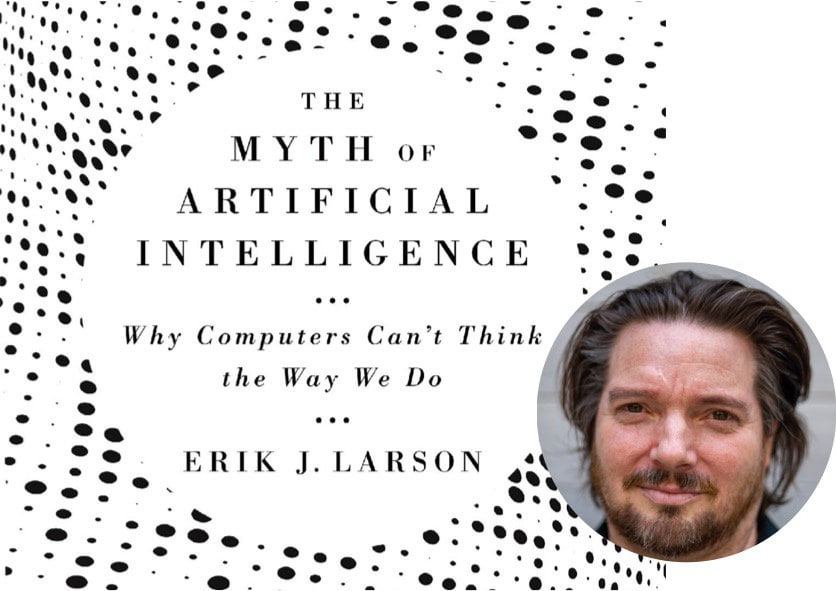
READ MORE
|

Jiddu Krishnamurti
1895 - 1986
Editor's note: Krishnamurti, very early on, saw the limitations of so-called artificial intelligence. See his 1959 lecture:
"The electronic brain can perform certain functions much faster and far more efficiently than the human mind, but it is not free. It cannot think of something new, it can only function in accordance with what it has been taught to do - and that is exactly the situation with the human mind, except that in the case of the human mind there is hope of freedom, of freshness, of newness. But the freshness, the newness cannot come into being as long as the mind is unaware of and does not understand the binding quality of authority, of knowledge."
|
Dr. Bernardo Kastrup: AI won't be conscious, and here's why
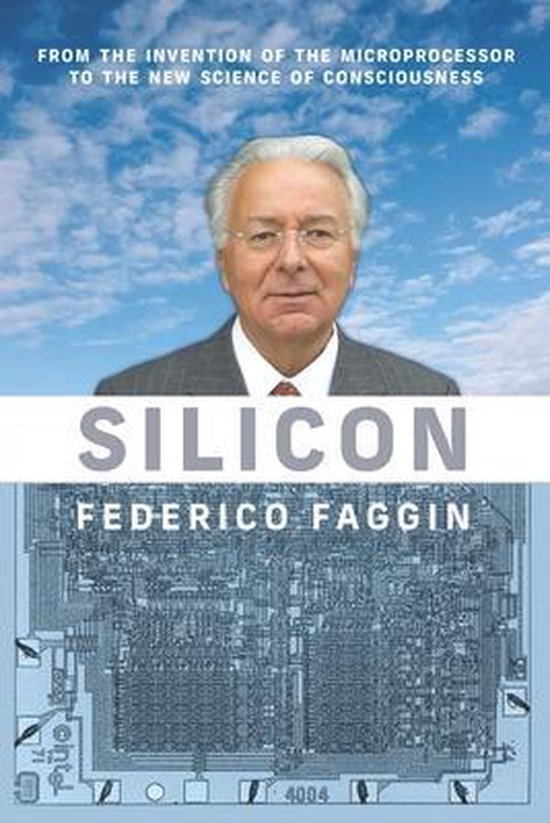
Dr. Federico Faggin: The Fundamental Differences Between Human and Artificial Intelligence
Dr. Federico Faggin: One and the Consciousness Units
Cambridge biologist Colin Tudge: The most important questions cannot be resolved by logic, calculation, the scientific method, or by conventional philosophy. How can we know what is true? All our ideas are founded upon layers of presuppositions, things that we must assume are the case but which we cannot ultimately show beyond all doubt really are.
Editor's Essay: An Alien's TravelGuide to Earth: Life, the Uncharted World - see the discussion between Eckhart Tolle and Peter Russell on consciousness.
|
Dr. Frederico Faggin, inventor of the silicon chip in 1971, is today advocating a new revolution in science: the primacy of consciousness over matter
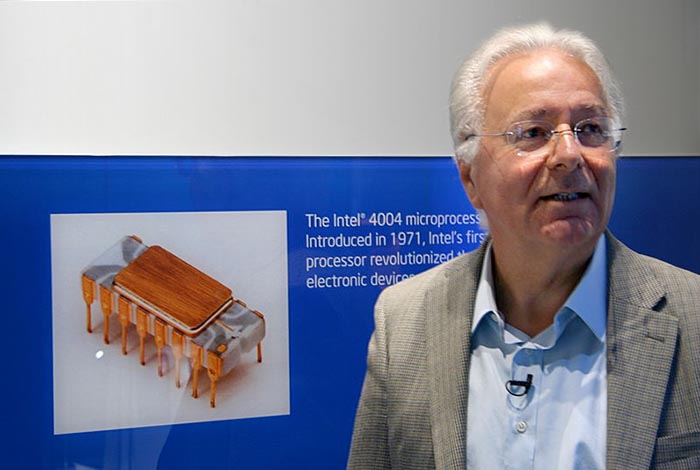
|
"The structure of matter is isomorphic to the cognitive structure of consciousness, which can reflect itself [in matter]"; our "bodies reflect the accumulated learning of consciousness; matter is the ink with which consciousness writes its own self-knowing."
|
READ MORE
|
Eckhart Tolle:
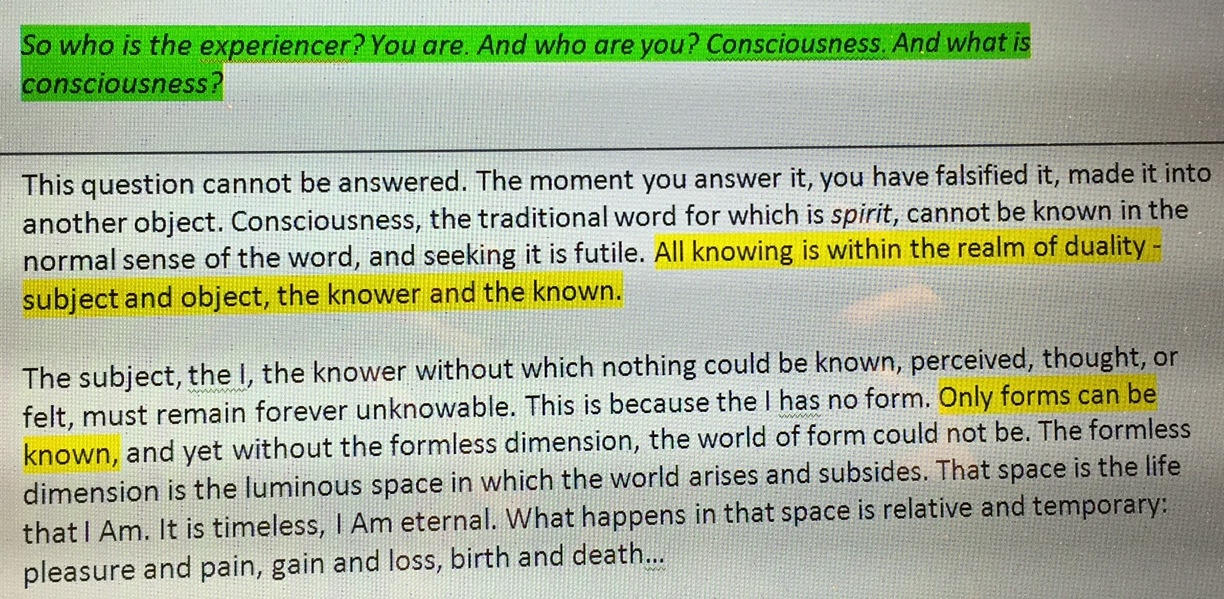
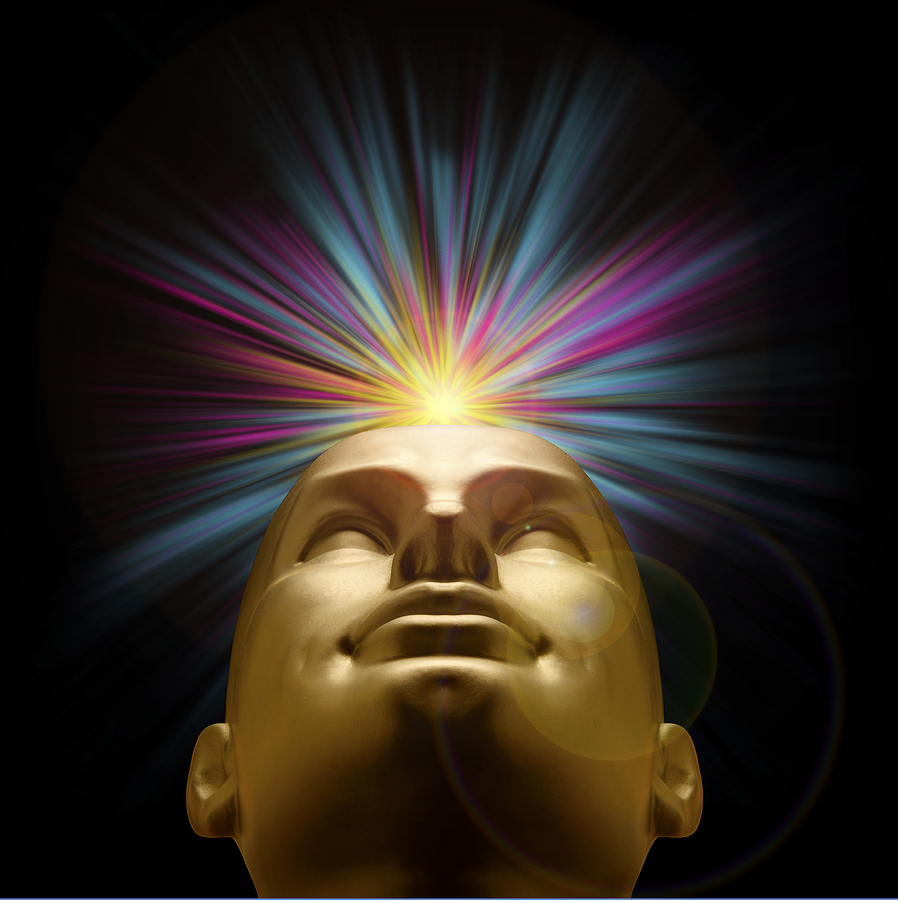
Dr. Bernardo Kastrup: "Reality is an excitation of consciousness."
attempting to define life and consciousness
|
K. Elenchus, it occurs to me that the reason why we see things more clearly when we enter the state of “no you and no me” is because, as we’ve said, what we are as “persons” is not a stand-alone entity before God.
E. This can be confusing because the Little Me Ego constantly preaches separateness.
K. It has its own agenda. But in reality we’re extensions of God, each of us a subdivision of Universal Consciousness, and not separate at all.
E. As Dr. Kastrup said, we’re like whirlpools in the same pond.

K. And so there really is “no you and no me” but only an illusion of separateness. No wonder we see more clearly when we mystically enter “no you and no me.”
E. It’s funny, the very word “individual” means “undivided”.
K. That is strange because we use that word to indicate “separate,” which is the very opposite of its literal meaning.
E. And the word “person,” too, means “mask”; again, the separateness is just a mask we wear.
K. Another false reading.
E. And so, what would you say, Kriss – what are we exactly?
K. Well, we have this sense of a thing called “I”, or a perception of self-awareness.
E. The term “ego” itself means “I” and imparts a feeling of self.
K. And "self" is accurate, but only to an extent. We are separate, but not as stand-alone entities, only “wholly owned subsidiaries of a parent corporation.”
E. I like that.
K. We say that we have “consciousness,” we say that we have “life.” But we have nothing of and by ourselves for what we have derives from a central Source.
E. From a larger perspective, it’s more accurate to say that we, not have but, “are” consciousness and life; because, beside these, there is no “me”.
K. We’re falling deeper down the rabbit-hole here, but when we say that we have self-awareness, a sense of “I,” this would mean, I take it, that the essence of Universal Consciousness is a perception that “I exist.”
E. Kriss, it’s noteworthy that one of the famous names of God in the Bible is “I am that I am," the self-existent one.
K. The original writer or shaman of that document channeled this information from higher sources. It's one of the accurate things in the Bible. And so we, as derivatives of God, experiencing a sense of “I am,” are in fact affirming that we're part of Universal Consciousness.
E. And how would you define “life”?
K. Fundamentally, what we call “life” is not a product of chemicals interacting – these merely sustain and perpetuate, but cannot originate.
E. They are editors not authors.
K. Yes, very good, editors not authors. And so it seems that “life”, necessarily so, is inherent within, or naturally flows from, Universal Consciousness, along with self-awareness. All these are indissolubly united, with no division possible.
E. You can’t have awareness without life. Can we have life without consciousness?
K. Many would say that consciousness resides only with higher-order entities. But maybe this isn’t totally true as even a stone, filled with the "life" of quantum activity, “knows” its place in the cosmic order. (See more discussion in "The Wedding Song".) But I think Dr. Sheldrake was onto something when he said that “consciousness is a quantum field of possibility.”
E. We confuse the definition of “life” with things like heart-beats and blood flow, but there are entities in worlds beyond ours, more alive than we, who don’t necessarily have heart-beats.
K. Mortals are prejudiced in favor of bodily definitions. But as we look at the issue more closely, the heart-beats and blood-flow are just a transient feature for lower-level creatures. The real essence of life has to do with Sheldrake’s “quantum field of possibility.”
E. What would you say this means for us still weighed down with the mortal body?
K. I think it means that each of us is a vast field of “no upper limit”, unbounded potential for growth – growth toward emulating Source.
E. We’re waiting for you to say, “oh, that little thing.”
K. I was getting to that.
|
Dr. Rupert Sheldrake: "The brain may be more like a television set than a hard-drive computer. What you see on tv depends on the resonant tuning to invisible fields." You can't know what you saw yesterday by the wires. The brain is a "a wave-form analyzer" like a radio or tv, rather than a storage system. Minds and brains are radically different
|
the purpose of the brain is to filter out, from universal consciousness, anything not correlating with the body’s perspective; in this ‘step-down transformer’ process, separate egos, with separate personal identities, emerge
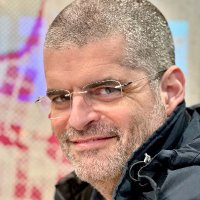
Dr. Bernardo Kastrup, PhD philosophy, PhD computer science, for many years worked at CERN, the large hadron collider in Geneva.
“… the function of the brain is to localize consciousness, pinning it to the space-time reference point implied by the physical body. In doing so, the brain modulates conscious perception in accordance with the perspective of the body.
a brain that filters implies the existence of unbound mind, a universal consciousness
"When not subject to this localization and modulation mechanism, mind is unbound: it entails consciousness of all there is across space, time, and perhaps beyond. Therefore, by localizing mind, the brain also ‘filters out’ of consciousness anything that is not correlated with the body’s perspective… like a radio receiver selecting [a particular station], among the variety [with] all other stations being filtered out and never reaching the consciousness of the listener…
"[T]he filter hypothesis implies that consciousness, in its unfiltered state, is unbound. As such, consciousness must be fundamentally unitary and non-individualized, for separateness and individualization entail boundaries.
Editor’s note: Father Benson from the afterlife speaks of a being, formerly mortal, five billion years old, so advanced as to enjoy awareness of all life-forms in the universe; in this, we see the future of the ‘unfiltered’ mind. Read More on the “500 hundred tape-recorded messages from the other side” page. Editor’s note: There may be those, still in this world, with powers of expanded mind, so extensive, that a certain far-flung awareness of items in the universe may exist right now. Consider the advanced shamans of the South American Kogi people. They know things that escape the rest of us. See the inset-box.
the filtering brain creates the illusion of separateness, of disconnected personal egos
"The emergence of multiple, separate and different conscious perspectives or egos, is a consequence of the filtering and localization process: different egos, entailing different perspectives on space-time, retain awareness of different subsets of all potential subjective experiences, the rest being filtered out. It is the difference across subsets that give each ego its idiosyncratic vantage point, personal history, and sense of personal identity.
Editor’s note: A brain designed to filter, and reduce to a trickle, experience does not substantively support a theory of reincarnation which exalts much experience. We do not come to this planet to gain experience, as such, but to individualize, to transform one’s tiny sub-set of universal consciousness into a personal ego. With this, we become ready for what comes next in the afterlife, even if we are not yet “good” persons, which can be accomplished later, but only after one becomes a person in one’s own right. Read More on this need for individualization.
the filtering brain creates the illusion of separateness, of disconnected personal egos
"The emergence of multiple, separate and different conscious perspectives or egos, is a consequence of the filtering and localization process: different egos, entailing different perspectives on space-time, retain awareness of different subsets of all potential subjective experiences, the rest being filtered out. It is the difference across subsets that give each ego its idiosyncratic vantage point, personal history, and sense of personal identity.
"The subjective experiences that are filtered out become the so-called ‘unconscious’ mind of the respective ego. Since each ego allows in only an infinitesimally small part of all potential experiences … the ‘unconscious’ minds of different egos will differ only minimally… As such, the filter hypothesis, unlike materialism, predicts the existence of a ‘collective unconscious’; a shared repository of potential experiences that far transcends mere genetic predispositions of a species…
the likely origin of the mystical experience
"[A]nd most importantly, the filter hypothesis predicts that one can have experiences that do not correlate with one’s brain states. Since here the brain is seen merely as a mechanism for filtering out experience … when this [filtering] mechanism is interfered with so as to be partially or temporarily deactivated, one’s subjective experience could delocalize, expand beyond the body in time and space, and perhaps even beyond time and space [giving rise to what is called the mystical experience]…”
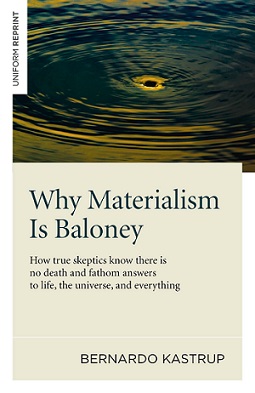
READ MORE on the “quantum mechanics” page
|
Martha Weiss, Georgetown Univ: Moths could remember what they learned as caterpillars, though most all of the caterpillar body had dissolved.
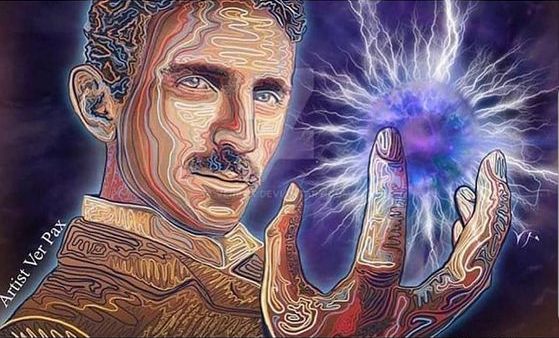 |
|
|
“The day science begins to study non-physical phenomena [the primacy of consciousness], it will make more progress in one decade than in all the previous centuries.”
"Physics extends beyond what is scientifically known today. The future will show that what we now call 'occult' or 'the supernatural' is based on a science not yet developed, but whose first infant steps are being taken as we speak."
“If you want to understand the Universe, think of energy, frequency, and vibration.”
“My brain is only a receiver, [and] in the Universe there is a core [of] knowledge, strength, and inspiration. I have not penetrated the secrets of this core, but I know it exists.”
Nikola Tesla
|
|
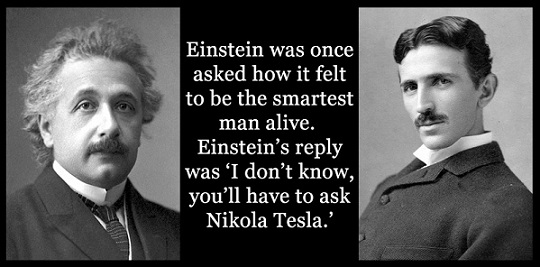 |
|
Marvel's The Watcher is like the mind’s silent background witnessing presence
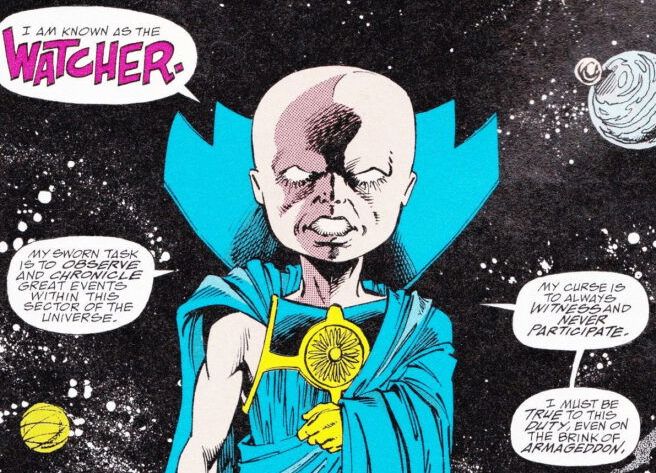
Marvel's The Watcher, introduced in Fantastic Four #13 1963
The silent Watcher merely observes, does not interfere, will render judgment, a sense of propriety or lack thereof, concerning the activities of the thinking mind. It's the part of us that knows we're thinking.
It is consciousness aware of itself, observing itself. Emily Dickinson spoke of the same in her “This Consciousness that is aware.”
And when we enter this self-monitoring, it might be the most powerful aid in terms of unfolding the entire inner person.
like corn growing in the night
There are too many metaphors here within short compass, but -- how does transformative change transpire?
It will come to be, as Thoreau used the phrase in Walden, “like corn growing in the night” – imperceptibly, unobtrusively, unsensationally – and you will be decimated, your world rocked, by realization of what had been around you, all of your life, but utterly unapprehended.
READ MORE
|
|
all facts are important
J. Arthur Hill: "Facts differ in importance, but it is a fundamental article of ... science that all facts are important in some degree.
all facts are important for, as they gather, an underlying tapestry of reality is revealed
"The import of some of them may not be clear at first, but continued collection brings about the possibility of valuable inferences. An orbit cannot be computed from one or two points given; many are necessary.
all facts are important and none of it is 'minor', for all knowledge is connected, Nature is of a piece and unfurls seamlessly, but only to the mind patiently assembling the data
"Similarly a number of facts — the more the better — may be required before we see their meaning. But there is a meaning, and it is worth our while to amass details patiently. This is the modern spirit [of science] — to inquire of Nature instead of building philosophic word-structures into the blue. Observation and record are the watchwords.”
|
|
‘truth is a living thing’
In his lectures, Krishnamurti states, “I am a living thing” or “truth is a living thing.” What is this “living thing”?
As K describes, and as we also come to personally know, when we become intensely alert, especially in a mental state of “no you and no me,” when psychological “distance” collapses between “subject and object,” when there is no existential separation, we will experience “sparks”, flashes of insight.
As we sensitize ourselves to this process – what is this process? – we begin to perceive the mind, the essential self, as a seething, roiling, churning mass of cognitive energy, in constant flux and movement. It begins to feel, very much, like a “living thing.”
What does it mean, “truth is a living thing”? Truth is a word for reality, “what is.” Universal Consciousness (UC), not matter, is the ground of all being, the elemental constituent, of the cosmos (see on the "quantum" page). Matter derives from UC. To say that truth is a living thing is to acknowledge truth’s linkage to UC. And what is UC? We could say that it is the mind of God.
We are individualizing units of UC. And UC is not only a “living thing” but the source of what we call life. We can feel, deep within, this to be true, this “living” reality, this vibrant, dynamic, pulsating “living” essence, throwing off “sparks” of insight, as we "open a channel" to the molding, shaping influence of UC.
All this needs to be actualized, reified, for us to truly understand. But once the process is under way, the “sparks” come every day – pop, pop, pop – as UC, the ultimate and quintessential “living thing,” reconfigures us in Its own image.
|
Dr. Rupert Sheldrake: "My own interpretation is that vision takes place through extended perceptual fields, which are both within the brain and stretch out beyond it… When I look at a person or an animal, my perceptual field interacts with the field of the person or animal I am looking at, enabling my gaze to be detected… My mind touches what I am seeing. Therefore I might be able to affect another person just by looking."
Dr. Pim van Lommel: The brain functions as an interface, from consciousness to the body, and from the body to consciousness.
Dr. Eben Alexander: The brain is a filter, a reducer, it dumbs down consciousness to a very slim trickle of information; answers are within us all, but it's by going deeply within consciousness that we might know this.
Dr. Stanislav Grof: Consciousness exists as an electromagnetic field outside the body. The brain functions as a "reducing valve" which reduces the amount of input of the cosmic energy that our brains can cope with. When the reducing function is altered (via various triggers such as drugs, psychosis, psychic ability, etc.) or shut down completely (producing a NDE), the cosmic energy and input that once made up our consciousness is then free to expand. This expansion is what explains these various types of mental visions. Every spiritual practice in the world has developed methods for helping people to have these kinds of experiences.
|
an ancient Spirit-Guide offers concurring testimony that (1) memory is not localized in the brain but in the mind, the soul; and (2) the brain acts as a filter and "dumbs us down":
“The memory does not reside [primarily] within the brain but within the mind… The memory, after leaving behind the physical shell [the brain], is considerably heightened and increased by comparison with that which is available to you while still in the flesh. The brain acts as a considerable handicap to memory, especially as the body ages.” The Abu Trust CDs, #39
|
Dr. Dean Radin, The Conscious Universe: "Quantum theory has been one of the most successful theories in history, but like any theory, it is an approximation of the world, not the world itself. If ten years from now PSI research convincingly demonstrates that quantum theory is merely a special case of a more comprehensive theory ... it will come as no great surprise to historians and philosophers of science."
Carl Jung: "It is almost an absurd prejudice to suppose that existence can only be physical. As a matter of fact, the only form of existence of which we have immediate knowledge is psychic [i.e., mind, our own sense of consciousness]. We might as well say, on the contrary, that physical existence is a mere inference, since we know of matter only in so far as we perceive psychic images mediated by the senses."
|
Is 'free will' an illusion?
A physicist-mathematician friend sent me an article featuring recent brain research. It seems to be a fact, as revealed by MRI scans, that several seconds before we make a “conscious” decision, the brain’s synapses have already begun firing, indicating that, on some unseen level, an aspect of ourselves is already “aware” of what we are going to “decide.”
This phenomenon has been touted as “proof” that we humans have no free will, as such; that it’s an illusion, with the physical brain as the true puppet-master of our lives.
I don’t think so. Below is a letter of response that I’d like you to see in case this question becomes a concern. As it is my general purpose to avoid attacking personalities, I have expunged names, and even actual quotations, from the research article – I’ll call the researcher “Smith.” You will be able to find this information on your own with a small bit of internet-searching.
I’ve been considering the information regarding the brain being “aware” of a decision before that which is usually deemed to be “conscious choice.”
Granted, this phenomenon is curious but, upon closer inspection, I see nothing here that would deny what I have come to view as human “limited free choice,” as per our discussion.
In my view, here is where “Smith” goes wrong in the article you offered. Let me quote a section:
Editor’s note: The actual article offered grand pronouncement that it’s a foolish notion to assert that our sense of self is centered in anything but neuro-chemical churnings of the brain. Moreover, “Smith” graciously posits or intimates that anyone thinking otherwise has no standing among civilized people.
This latter statement by “Smith” [regarding no educated person doubting the supremacy of the brain] Immediately prompted me to exclaim, "He’s a materialist; and a brash one." He does not accept the evidence of the afterlife, and, in his hubristic thinking, anyone who disagrees with him is not worthy of consideration. He’s either incompetent or willfully ignorant of a large corpus of research indicating that mind/consciousness is not localized in the brain. In the last 100 years or so (including recent developments), 20 Nobel laureates, plus a great number of other notables, have investigated and accepted the evidence that mind/consciousness, existing without necessary connection to the brain, survives dissolution of the body.
Editor’s note: Regarding new research of the primacy of Consciousness, see my “evolution” writing for a sub-article devoted to the “Grinsberg experiment.” As described by Dr. Amit Goswami, two individuals meditate together for twenty minutes with the intention of nonlocal connection. They maintain this intention of connection even when they are separated after twenty minutes and put in individual Faraday cages (enclosures impervious to electromagnetic signals). The subjects are connected to EEG machines that record brain waves. One of them is shown a series of light flashes, inducing electrical activity in the brain, which is recorded by the EEG. Unexpectedly, a similar record is made on the EEG of the partner in another Faraday cage, who has not been subjected to any light flashes. If electrical potential can be transferred from one brain to another without any electromagnetic signal, a nonlocal connection must exist between them. This nonlocal connection is their unitive quantum consciousness. The writer of the article was too busy calling others stupid to inform himself of latest empirical research. There is a power, or a presence, or an energy behind the choices of the brain and the ego. It is aware of activity in the body before it happens.
“Smith” has blinders on and has closed his eyes to voluminous information that does not fit his materialistic paradigm. He’s not an objective and credible source and will skew information in favor of a materialistic view. Over the years, I have come across many, many “respected” researchers who will engage in out-and-out fraud – “fake news” -- to suppress the evidence of the afterlife. This is easily demonstrated and common knowledge among those who support a more holistic outlook.
Dr. Rupert Sheldrake is a good place to start for a more balanced approach. See his research on the hegemony of the mind versus the brain in terms of both control of the body and survival of consciousness upon the body’s (i.e., the brain’s) death.
Despite the skewed materialistic tenor of this article, it does offer a benefit in terms of sharpening a focus regarding the inner-workings of the brain. The “pre-firing” of synapses before “conscious” decision would suggest that the mind/higher-consciousness/intuition, as separate from the brain, works precognitively “behind the scenes” before “John on main-street” knows what’s happening. See Dr. Dean Radin's many experiments in this area of consciousness research.
The bottom-line? – the acorn has “choice,” a very narrow one, only to become the towering oak, not an eagle nor a snapfish. One might delay and pervert this inner directive, and that’s a “choice,” too, but while there is no such thing as absolute freedom regarding volition, it goes too far to suggest that one has no say at all in the matter. Only a materialistic view, which, at core, is but the “fear of death” on parade, would attempt to recast this process.
Best regards to you, and thank you for sharing this article, Wayne
P.S. There is another version of this attempt to de-humanize individuals. Materialistic historians view the movers-and-shakers of the world as “little more than pawns of powerful social forces.” Why this insistence and great effort by materialists to rob humankind of volition? It's is a form of the “fear of death.” Those who fear judgment, and accountability for one’s actions, seek refuge in meaninglessness, an existential vacuum.
|
The following is channeled information via the mediumship of William W. Aber, the Psychic Research Society, as reported in “The Rending Of The Veil” (1898), compiled by J.H. Nixon. Testimonies were offered by numerous spirit-persons by means of full-form visible materialization. Spirit Dr. Reed speaks:
"Friends, many of you have been wondering why we have never explained to you what we think is the cause of insanity. After investigation for some time, I find that insanity proper is caused by diseased brain. The spirit controls the body through the brain, and when that is out of harmony it is impossible for the spirit to get perfect control. Your best musicians cannot make perfect music on an imperfect or broken instrument. Neither can the spirit direct the human body through a diseased brain. An insane person, on passing out of the mortal, regains sanity at once. He may be a little confused at first, as such persons seldom realize their condition when leaving the body. You will notice in my first remarks I used the expression 'insanity proper.' I did that because we recognize two classes of insane subjects. I will say, one-third, at the least, of your so-called insane patients are only the victims of a powerful obsession; and I believe—in fact, I know—all such could be cured through the use of hypnotic power. In this way the obsessing spirit would be driven away and their own spirit would regain control of the body.” Editor's note: See Dr. Wickland and his work concerning spirit possession.
Baruch Spinoza: "We feel and know that we are eternal."
|
the transforming power of the quiet small room
Emily Dickinson (1830-1886); the poet's bedroom
According to a biographer, Dickinson was known to her neighbors as a “recluse,” an “enigmatic woman ... rarely leaving her house, or even her bedroom, during the last quarter century of her life.”
She’d experienced a trauma around age 30. To a friend in 1862, Emily confided, “I had a terror since September, I could tell to none.” Subsequent writings reveal deep undercurrents of sorrow.
all of us suffer, but not all of us see
What we do know is that she was able to transform her grief, arguably, into the most insightful didactic poetry ever produced -- 1775 offerings -- concerning the essence of consciousness, the nature of suffering, the meaning of life and death, and the true self.
|
The following is channeled information via the mediumship of William W. Aber, the Psychic Research Society, as reported in “The Rending Of The Veil” (1898), compiled by J.H. Nixon. Testimonies were offered by numerous spirit-persons by means of full-form visible materialization. Spirit William Denton communicates: “Mind, as the expression of a relation between the soul and the body, necessarily disappears when that relation is discontinued. But a far higher order of intelligence, volition, and will-power is manifested by the spirit in spirit life so soon as separated from the physical body.”
Benjamin Hoff: "Everything has its own place and function. That applies to people, although many don't seem to realize it, stuck … in the wrong job, the wrong marriage, or the wrong house. When you know and respect your Inner Nature, you know where you belong. You also know where you don't belong."
Bryant McGill: "True freedom is where an individual's thoughts and actions are in alignment with that which is true, correct, and of honor - no matter the personal price."
|
Eckhart Tolle, The New Earth
the small ego: possessed by the mind
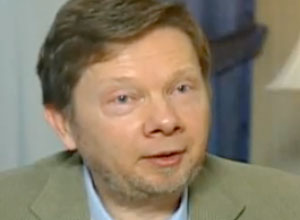
THE CORE OF EGO
Most people are so completely identified with the voice in the head – the incessant stream of involuntary and compulsive thinking and the emotions that accompany it – that we may describe them as being possessed by their mind.
As long as you are completely unaware of this you take the thinker to be who you are. This is the egoic mind. We call it egoic because there is a sense of self, of I (ego), in every thought – every memory, every interpretation, opinion, viewpoint, reaction, emotion. This is unconsciousness, spiritually speaking. Your thinking, the content of your mind, is of course conditioned by the past: your upbringing, culture, family background, and so on.
The central core of all your mind activity consists of
certain repetitive and persistent thoughts, emotions, and reactive patterns that you identify with most strongly. This entity is the ego itself. In most cases, when you say “I,” it is the ego speaking, not you, as we have seen. It consists of thought and emotion, of a bundle of memories you identify with as “me and my story,” of habitual roles you play without knowing it, of collective identifications such as nationality, religion, race, social class, or political allegiance. It also contains personal identifications, not only with possessions, but also with opinions, external appearance, longstanding resentments, or concepts of yourself as better than or not as good as others, as a success or failure.
The content of the ego varies from person to person, but in every ego the same structure operates. In other words: Egos only differ on the surface. Deep down they are all the same. In what way are they the same? They live on identification and separation. When you live through the mind-made self
comprised of thought and emotion that is the ego, the basis for your identity is precarious because thought and emotion are by their very nature ephemeral, fleeting. So every ego is continuously struggling for survival, trying to protect and enlarge itself. To uphold the I-thought, it needs the opposite thought of “the other.” The conceptual “I” cannot survive without the conceptual “other.” The others are most other when I see them as my enemies. At one end of this scale of this unconscious egoic pattern lies the egoic compulsive habit of faultfinding and complaining about others.
Jesus referred to it when he said, “Why to do you see the speck that is in your brother's eye, but do not notice the log that is in your own eye?” At the other end of the scale, there is physical violence between individuals and warfare between nations. In the Bible, Jesus' question remains unanswered, but the answer is, of course: Because when I criticize or condemn another, it makes me feel bigger, superior.
|
Buddha: "When the mind is pure, joy follows like a shadow and never leaves."
Don Juan: "We are perceivers. We are an awareness; we are not objects; we have no solidity. We are boundless. The world of objects and solidity is a way of making our passage on earth convenient. It is only a description that was created to help us."
|
Consciousness, not matter, discovered to be elemental by the Kogi people of South America
In the “creativity” article, we spoke of the famous painting wherein Isaiah is listening.

Isaiah listening versus Isaiah questioning
We in the West are proud of the scientific method; and, rightly so, as it’s produced an awesome array of technological advancement.
However, there’s another, entirely different, but absolutely valid, approach to knowledge production of which we tend to be oblivious. It is the realm of intuition, of creativity’s “discontinuous” leaps forward, the quantum realm of the mind’s infinite possibilities, the child of Universal Consciousness.
In this latter world, Isaiah does best just to listen and will refrain from asking questions. Why this diminishment of questioning? Questioning does fine when allied with the scientific method but gets in the way when we enter the intuitive realm. The problem with questioning is that it presumes an intellectual framework into which we desire new information to fit. In a sense, we've already decided what the answer ought to be. But what if the answer is far above our present paradigms of knowledge with no correspondence to present understanding; in such case, it would be best to maintain silence and simply listen, as “The Wedding Song” uses the phrase, to “something never seen before.”
What I’m about to introduce must be presented in severe elliptical fashion. Brevity must rule as the subject is too large, but worthy of extensive study and consideration. I hope that you will learn more by searching the linked references.
the Kogi people have learned to listen
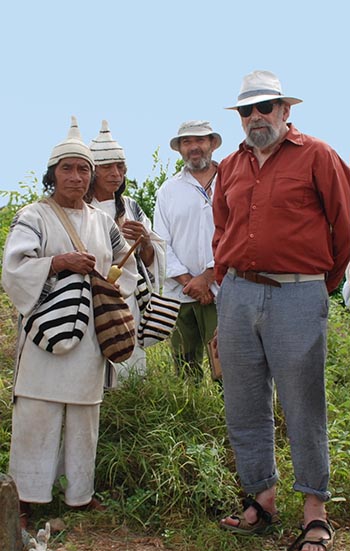
For some decades British journalist-anthropologist Alan Ereira has investigated the high-mountain tribal Kogi people who live in the Sierra Nevada de Santa Marta in the north of Colombia.
The Kogi have learned to listen to the whispering messages of Universal Consciousness, as expressed in Nature, to a degree that might be unrivaled in the world, save for the best medicine men of North American indigenous peoples.
We have discussed this form of "listening", this "going within" to access Universal Intelligence, on the "true self" page. But the Kogi are masters, far ahead in this, and take it to high art-form.
How can we confirm their expertise? The Kogi know things, and are able to do things, for example, in terms of environmental cleansing, reforesting, of healing the land, that we in the West are not able to do.
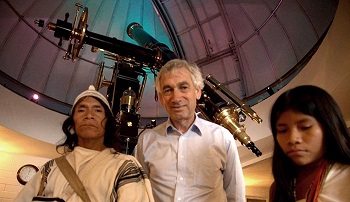
immediately picks out the one star in a blizzard of galaxies
During a trip to London, this Kogi master met with a leading astronomer. A photograph was brought out of the Hubbell “deep field,” a tiniest postage-stamp, and apparently empty, section of the inky blackness which, under intense magnification, revealed some few thousand galaxies. As confirmed by the astronomer in the video, the Kogi immediately pointed to the single star – not a galaxy – amidst the blizzard array and, in Kogi language, referred to it by name; as if it were a close friend! All this is sensational enough, but, let's keep in mind, this star resided in a section of the heavens totally hidden and unknown, totally inaccessible to human eyes, until just a few years ago.
Much of the Kogi wisdom remains cloaked to us. They refer to us in the West as their “younger brothers.” Prodigal brothers, we take it. They don’t fully trust us to do the right thing, as the memories still linger of the RCC-Conquistador brutalities and genocide.
But the Kogi understanding of Universal Consciousness (UC) is right in line with what physicists such as Prof. Amit Goswami tell us about the quantum realm: UC represents infinite possibility but has pared down the choices so as to direct reality toward prescribed goals and destinies. In this vein, Alan Ereira reports that Kogis have a view of “Mother [Consciousness] as memory and possibility.” This is Dr. Rupert Sheldrake’s “the mind is a quantum field of possibility.”
Out of this primordial essence of Mother Consciousness -- which is the ground of reality, not matter -- all things were created. However, before she created, she “explored, almost infinitely” the various possibilities to arrive at just the right mix for those of us who would inhabit Earth. This is the answer to Leibniz’s question of the “best of all possible worlds.”
See Beshara Magazine's article on the Kogi.
See Alan Ereira's report.
View Alan Ereira's video.
|
Albert Einstein: "A human being is a part of the whole, called by us 'Universe,' a part limited in time and space. He experiences himself, his thoughts and feelings as something separated from the rest -- a kind of optical delusion of his consciousness. This delusion is a kind of prison for us, restricting us to our personal desires and to affection for a few persons nearest to us. Our task must be to free ourselves from this prison by widening our circle of compassion to embrace all living creatures and the whole of nature in its beauty. Nobody is able to achieve this completely, but the striving for such achievement is in itself a part of the liberation and a foundation for inner security."
|
Eckhart Tolle, Enlightened Relationships
romantic partners evolve at different speeds; and some may not evolve at all for a while...

[Romantic] partners evolve, the evolution of consciousness … at different speeds; and some may not evolve for a while at all, and so it’s possible that suddenly the awakened consciousness comes into you and your partner remains where he or she is, as you go into enormous “presence” and aliveness and newness while he or she is still the same – no change.
And then, wait a little and see – it’s quite possible that your state of awakening transmits itself, if there’s the slightest degree of readiness in the other, the fact that you no longer strengthen his or her egoic mind anymore by opposing – and this is vital: don’t oppose the egoic mind – express your viewpoint without hostile opposition. Something may happen, an opening may happen. Or it is possible that you may have to [temporarily] separate…
The “pain-body” looks to intimate relationships as its favorite place to feed and strengthen itself… the “pain-body” is accumulated pain [a memory of past sufferings] which is an energetic field, almost an entity which lives within you, that lives on emotional suffering… The pain-body seeks to take over your partner, makes them say or do things that are completely out of character… It is a shock to marry somebody, and then two or three weeks later a totally different person is there, in a deeply negative energy field, says hurtful things, misinterprets what you do – “Who did I marry?” – this is not the real person attacking you, but the pain-body… The pain-body is the emotional aspect of the dysfunctional ego, and it wants your negative reaction, so as to strengthen its sense of otherness and separateness… It comes out periodically, and then goes back… It is perhaps the most destructive aspect of relationships… the negative thinking is the thinking of the pain-body… It will blame you, accuse you, it knows your weakest points, hit your hot buttons, and will try to bring out the pain-body in you… You must be “present” enough so that you are not taken over by this attack.
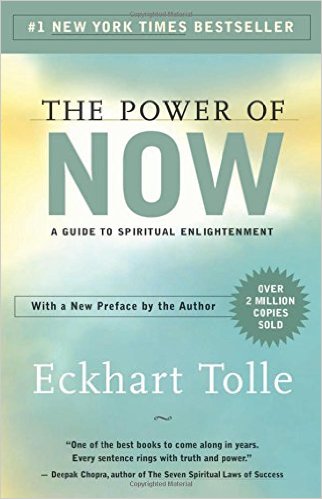 |
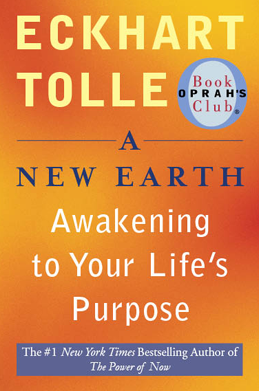 |
|
Kevin Williams: "Dr. Michael Sabom is a cardiologist whose latest book, Light and Death, includes a detailed medical and scientific analysis of an amazing near-death experience of a woman named Pam Reynolds. She underwent a rare operation to remove a giant basilar artery aneurysm in her brain that threatened her life. The size and location of the aneurysm, however, precluded its safe removal using the standard neuro-surgical techniques... She was referred to a doctor who had pioneered a daring surgical procedure known as hypothermic cardiac arrest. It allowed Pam's aneurysm to be excised with a reasonable chance of success. This operation, nicknamed 'standstill' by the doctors who perform it, required that Pam's body temperature be lowered to 60 degrees, her heartbeat and breathing stopped, her brain waves flattened, and the blood drained from her head. In everyday terms, she was put to death. After removing the aneurysm, she was restored to life. During the time that Pam was in standstill, she experienced an NDE. Her remarkably detailed veridical out-of-body observations during her surgery were later verified to be very accurate. This case is considered to be one of the strongest cases of veridical evidence in NDE research because of her ability to describe the unique surgical instruments and procedures used and her ability to describe in detail these events while she was clinically and brain dead."
Life In Two Spheres, or Scenes in the Summerland, by Hudson Tuttle, channeled testimony from the other side:
"Wretch! Wretch! Wretch,” he exclaimed in anguish."Oh, that I had never been born!”
The Sage, taking him by the hand, raised him up, saying: "Self-accusing child, why blame yourself thus? Blame no one for their follies, but the circumstances in which you were placed. They were bad; popular opinion, before which you bent , was bad. All tended to make you what you were. You have a germ of native goodness in your being, or you would not thus accuse yourself. Arise! weep no more! The future is bright.” ...
"You have corrected me aright; I acknowledge your superior spiritual powers of perception reverentially."
"Reverence not me; I am no more than the others. We acknowledge submission to no one. Each is his own individual sovereign, to think and act as best pleases himself, if he is regardful of the rights of others and is measured by his worth alone. If you are thankful express it, not by words or gestures, but by actions. Reverence not me, but truth. You are still prejudiced on this and kindred subjects, and your prejudice must be overcome."
Dr. Gary E. Schwartz: "Years ago, when I was a professor at Yale, I stumbled on a hypothesis about how systems store information... it had led me ... to recognize the possibility that consciousness might survive after death... All systems, in the process of becoming and remaining whole, store information dynamically. Systems are composed of component parts that share information and energy - from atoms and chemicals, through cells and organisms, to planets, galaxies, and the universe as a whole... Mathematical logic leads to the conclusion not only that all systems are 'alive' to various degrees, but also that this information continues as a living, evolving energy system after the physical structure has ceased to exist. Following the logical line of reasoning, everything I knew about physics and psychology forced me to entertain the hypothesis of living info-energy systems."
Sir Oliver Lodge, in a letter to J. Arthur Hill: “That the Cosmos is in some sense or other the ‘body‘ of God, or may be so regarded, seems to be more or less inevitable. That is, it is God’s mode of manifestation, or one of His modes. Just as our bodies are the chief ordinary mode of manifestation for us, though there may be telepathic and other methods which transcend the body…”
Aghori Vimlananda: "To be really aware you must be able to know simultaneously what is going on thousands of miles away today, what may have happened centuries ago, what will happen anywhere in the world decades from now, and what is occurring, has occurred, or will occur on other planes of existence. And you must still act as if you know nothing. You must just sit and talk with other people and play the part which Nature has assigned to you."
Ajahn Chah: “The ultimate truth is like the flavor of an apple which you can’t see with the eye or hear with the ear … Once you taste it, you are no longer in any doubt about its flavor and you do not have to ask anyone else.”
Esther de Waal: "The journey by which we discover God is also the journey by which we discover, or uncover, our true self hidden in God. It is a journey that we all have to make."
|
Eckhart Tolle, from his lecture, "The Flowering of Human Consciousness"
"God" cannot be known conceptually but only within the inner self's stillness

In the ancient scriptures of India called the Upanishads, there are some beautiful lines:
Not that which the eye sees, but that whereby the eye can see, know that alone to be Brahman the Eternal and not what [religious] people here adore;
Not that which the ear hears, but that whereby the ear can hear, know that alone to be Brahman the Eternal and not what [religious] people here adore;
Not that which the mind thinks, but that whereby the mind can think, know that alone to be Brahman the Eternal and not what [religious] people here adore.
Editor’s note: The word “Brahman” points to “Universal Consciousness.” Its Sanskrit root signifies "to swell, expand, grow, enlarge." There is a saying, "Brahman is real, the world is unreal"; i.e., the world has no absolute reality but only a derivative existence from Brahman: "All is truly Brahman," and “Brahman is like the infinite string upon which all things hang as pearls, which discrete cosmetic is likened to individual Atman [the true self, the soul of an individual beyond identification with phenomena]. “A human being must acquire self-knowledge (atma jnana), which is to realize that one's true self (atman) is identical with the transcendent self, Brahman.” Today, a growing number of quantum physicists say, "only Consciousness is real," a sentiment well in line with the ancient Upanishad wisdom.
And this is a beautiful illustration: “…not what people here adore” – that is, “God” or your essential nature is not “something,” not “content,” not “form.” The best description through words is “not,” to say “what it is not.” And then you’re left with what it is, which cannot be named – but can be known, but cannot be known conceptually, because every concept is again a name, a form. It can be known, silently, easily, in the space of “stillness” – which is in everyone, underneath the mental noise, the egoic sense of self – which [i.e., the “stillness,” the essential nature, the true self,] is not separate from the essence of the universe.
Are these just words? Yes, but the words point; they cannot encapsulate, they cannot explain. The mind wants “content” and “form” instead of allowing the pointers to point. The mind wants to examine the pointer. The mind can’t get it. The words point to a dimension of the formless One Life, that is “you,” the dimension of stillness within; extremely awake, but still.
|
Esther Hicks: "Man in his effort to pray and receive guidance actually enhances his separation from who he really is and what he is reaching for. In time, you have all answers to all questions." "With the right alignment, everything you want makes its way into your experience. You are the keeper of your own gate."
G.K. Chesterton: "There is a road from the eye to the heart that does not go through the intellect."
George Orwell: “The essence of being human is that one does not seek perfection.”
J. Donald Walters: "Intuition is the innate ability in everyone to perceive truth directly - not by reason, logic, or analysis, but by a simple knowing from within. That is the very meaning of the word "intuition": to know, or understand from within - from one's own self, and from the heart of whatever one is trying to understand. Intuition is the inner ability to see behind the outer forms of things to their inner essence."
J.C.F. von Schiller: "I am my own heaven and hell!"
James Allen: "A man sooner or later discovers that he is the master-gardener of his soul, the director of his life."
James Redfield: “If we knock on the door until it opens, not taking no for an answer, our lives will be transformed as we step up into a higher awareness.”
Jean Klein: "Nothing that can be known has existence in itself. It depends on a knower. The knower is consciousness."
Jean Rhys: "I am the only real truth I know."
Jean-Jacques Rousseau: "Nature does not deceive us; it is we who deceive ourselves."
Jiddu Krishnamurti: "It is an extraordinarily dull mind that wants excitement, and goes outside itself to get it."
Jeremy Aldana: "Each time a man looks into your eyes, he is only searching to find himself; for he knows already, that he is part of you."
Brent Haskell: "The separation never happened. Hear me well. The separation is not real. The separation is but a figment of imagination, and nothing more."
Joan Rivers: "Don't follow any advice, no matter how good, until you feel as deeply in your spirit … that the counsel is wise."
Goethe:“Man is not born to solve the problems of the universe, but to find out what he has to do... As soon as you trust yourself, you will know how to live."
John Keats: "That which is creative must create itself."
Gina Lake: "The ego isn't actually an entity. Rather, it is the sense of being a separate individual. We feel like individuals, although we are in actuality manifestations, or expressions, of One Being...Encased in this human body, we have lost awareness of our true nature and are meant to rediscover the truth."
Gisele Bundchen: "The more you trust your intuition, the more empowered you become, the stronger you become, and the happier you become."
Haridas Chaudhuri: “The greater the emphasis on perfection, the further it recedes.”
Heraclitus: "Eyes and ears are poor witnesses to people if they have uncultured souls."
Herb Goldberg: "The struggle of the male to learn to listen to and respect his own intuitive, inner prompting is the greatest challenge of all. His conditioning has been so powerful that it has all but destroyed his ability to be self-aware."
Aldous Huxley: "Experience is not what happens to you - it's how you interpret what happens to you."
Amaterasu: "Be in the NOW. This is your key to operation at this time. This is how you receive the information you need at any given moment. In the now you can 'hear' and 'know' what to do from the information received. It is not hard. It is not difficult to learn. You have all done it before. Try it now. Ask the universe a question and listen. This is the key - empty your mind and listen - stop being afraid - still your ego and truly listen. What does the still small voice say to you? This is your way to hear your information. Let the information come from your stilled heart and be interpreted by your brain. Then you can trust..."
Anaïs Nin: “We do not grow absolutely, chronologically. We grow sometimes in one dimension, and not in another; unevenly. We grow partially. We are relative. We are mature in one realm, childish in another. The past, present, and future mingle and pull us backward, forward, or fix us in the present. We are made up of layers, cells, constellations.”
Carl Sagan: Think of what consciousness feels like, what it feels like at this moment. Does that feel like billions of tiny atoms wiggling in place?
Edward Carpentier: "If you inhibit thought (and persevere) you come at length to a region of consciousness below or behind thought ... and a realization of an altogether vaster self than that to which we are accustomed. And since the ordinary consciousness, with which we are concerned in daily life, is before all things founded on the little local self ... it follows that to pass out of that is to die to the ordinary self and the ordinary world. It is to die in the ordinary sense, but in another it is to wake up and find that the 'I,' one's real, most intimate self, pervades the Universe and all other things - that the mountains and the sea and the stars are a part of one's body and that one's soul is in touch with the souls of all creatures."
Eugene Wigner, physics Nobel Laureate: "It will remain remarkable, in whatever way our future concepts develop, that the very study of the external world led to the conclusion that the content of consciousness is an ultimate reality."
Stephen M. Barr, theoretical particle physicist: "This conclusion is not popular among those who would reduce the human mind to a mere epiphenomenon [secondary element] of matter. And yet matter itself seems to be telling us that its connection to mind is more subtle than is dreamt of in their philosophy."
Max Planck, physics Nobel Laureate, "father of quantum mechanics": "Science cannot solve the ultimate mystery of nature ... because, in the last analysis, we ourselves are a part of the mystery that we are trying to solve."
Arnold Bennett: “There can be no knowledge without emotion. We may be aware of a truth, yet until we have felt its force, it is not ours. To the cognition of the brain must be added the soul experience.”
Arthur Schopenhauer: "Every man takes the limits of his own field of vision for the limits of the world."
Atisha: “Avoid places that disturb your mind, and always remain where your virtues increase."
Goethe: "Someday perhaps the inner light will shine forth from us, and the we'll need no other light."
Joseph Campbell: “Follow your bliss and don’t be afraid, and doors will open where you didn’t know they were going to be.” "Our true reality is in our identity and unity with all life."
Juvenal: "Who is to guard the guards themselves?" "Never does nature say one thing and wisdom another."
Kabir Helminski: "The person who makes all cares into one care, the care for simply staying present, will be cared for by that presence which is creative love."
Ken S. Keyes: “I have everything I need to enjoy my ‘here and now’ -- unless I am letting my consciousness be dominated by demands and expectations based on the dead past or the imagined future.”
Kiana Tom: "I always trust my gut reaction; it's always right."
Lao Tzu: “At the center of your being you have the answer; you know who you are and what you want." "If you want to shrink something, you must first allow it to expand. If you want to get rid of something, you must first allow it to flourish. If you want to take something, you must first allow it to be given... Let your workings remain a mystery.”
Leland Lewis: "God Transcends all concepts. Only ego presumes that the All Pervading Divine Presence could be reduced to words."
Leonard Jacobson : "We are on a journey of becoming that which we already are. That is the impossible paradox of our lives."
Liara Covert: "You see only what you are ready and willing to accept." “Notice what happens as you let go of what you think you know and allow what is absolutely so to reveal itself. The truth of cosmic oneness is unalterable."
Lin Jensen: "Each of our lives is a path. To know this requires intuition and trust. If we are true to the steps we take, the travel makes sense and the journey confirms itself."
Llewellyn Vaughan-Lee: "Oneness is very simple: everything is included and allowed to live according to its true nature. This is the secret that is being revealed..."
M.C. Escher: "Are you really sure that a floor can't also be a ceiling?"
Magenta Pixie: “All higher-dimensional understanding comes from the oneness that exists within a frequency of bliss-charged love. For it is this frequency that allows your DNA to spin and take you to worlds far beyond three-dimensional physicality."
Auguste Renoir: "An artist, under pain of oblivion, must have confidence in himself, and listen only to his real master: Nature."
Barbara Cook: "If you're able to be yourself, then you have no competition. All you have to do is get closer and closer to that essence."
Barbara Marciniak: “Everything changes when you start to emit your own frequency rather than absorbing the frequencies around you, when you start imprinting your intent on the universe rather than receiving an imprint from existence."
Robert Anton Wilson (and the German philosopher, Husserl): "All perception is a gamble." Wilson: All ignorance in the world is the result of not understanding that our perceptions are gambles. We believe what we see, and we believe our interpretation of it, and we don't even know that we are making an interpretation of it. We think this is reality. This is called naive realism. 'What I see is reality!' Philosophers have [spoken out against] naive realism every century for the last 2500 years and yet most people still act on the basis of naive realism. What we think is true is true only relative to the instrument that we are using. There is no vantage point from which we can see full reality. We're all looking at the universe from the perspective of our own reality tunnels. Light is neither waves nor particles until we look, and then it adjusts itself depending on what we are looking at it with. An electron is not anywhere until we look. And, when we look, the electron decides to be somewhere; as soon as we stop looking the electron is everywhere again. Every model of reality we make tells us as much about how our mind works as it does about reality. Any description of the universe that leaves you out is inaccurate, because any description of the universe is also a description of the instrument that you used to take your reading. So, any model we make of the universe [incomplete as it will be] is not solely a model of the universe but also describes what our brains are capable of saying or knowing at this time.
Mahatma Gandhi: "There is not a moment when I do not feel the presence of a Witness whose eye misses nothing and with whom I strive to keep in tune."
Marilyn Ferguson: "Fear is a question: What are you afraid of, and why? … our fears are a treasure house of self-knowledge if we explore them."
Martha Beck: "Your body is free but your heart is in prison. To release your heart, you simply reverse the process which locked it up. First you begin to listen for messages from your heart—messages you may have been ignoring since childhood. Next you must take the daring, risky step of expressing your heart in the outside world. . . . As you learn to live by heart, every choice you make will become another way of telling your story. . . . It is the way you were meant to exist. If you stop to listen, you’ll realize that your heart has been telling you so all along."
Matt Kahn: "One of the most commonly overlooked spiritual practices is daring to be completely honest with everyone you encounter. Some may say others cannot handle their honesty, but true honesty is not a strategy or a weapon of any kind. It is the willingness to be open and absolutely transparent in sharing how any moment feels in your heart.”
Michel de Montaigne: “When I quote others I do so in order to express my own ideas [or inner knowing] more clearly."
Muhammad Asad: "...all the answers are but waiting for us while we, poor fools, ask questions and wait for the secrets of God to open themselves up to us: when they, all the while, are waiting for us to open ourselves up to them..."
Nicolaus Copernicus: "I am aware that a philosopher's ideas are not subject to the judgment of ordinary persons, because it is his endeavor to seek the truth in all things, to the extent permitted to human reason by God."
Nirmala: "It doesn't matter what's happening... what matters is how you touch it."
Nisargadatta Maharaj: “Love says ‘I am everything.’ Wisdom says ‘I am nothing.’ Between the two, my life flows.” “To know yourself, be! ...stop imagining yourself to be this or that. Just be. Let true nature emerge. Don't disturb your mind with seeking."
Paramahansa Yogananda: "The so-called miraculous powers of a great master are a natural accompaniment to his exact understanding of subtle laws that operate in the inner cosmos of consciousness."
Patrul Rinpoche: “The best scholar is one who has realized the meaning of no-self. The best monk is the one who has tamed his own mind. The best quality is a great desire to benefit others. The best instruction is always to watch the mind. The best remedy is to know that nothing has any inherent reality. The best way of life is one that does not fit with worldly ways. The best accomplishment is a steady lessening of negative emotions. The best sign is a steady decrease of desires.”
Pierre Teilhard de Chardin: "We are not human beings having a spiritual experience; we are spiritual beings having a human experience."
Prentice Mulford: “Every thought of yours is a real thing – a force."
Rabia al-Adawiya: "Great doubt will eventually lead to great awakening."
Rainer Maria Rilke: “The only journey is the journey within."
Rhonda Byrne: “The truth is that the universe has been answering you all of your life, but you cannot receive the answers unless you are awake."
Rita Coolidge: "I choose things by how they resonate in my heart."
Robin Rice: "There is nothing wrong with you. Be who you are."
Sri Chinmoy: "Each individual has to know himself. He has to know himself as the infinite, eternal and immortal Consciousness."
Sue Atchley Ebaugh: "How I relate to my inner self influences my relationships with all others. My satisfaction with myself and my satisfaction with other people are directly proportional."
T.S. Eliot: “Poetry may make us from time to time a little more aware of the deeper, unnamed feelings which form the substratum of our being, to which we rarely penetrate; for our lives are mostly a constant evasion of ourselves.”
Vanna Bonta: "A heart needs only its own voice to do what is right."
Walter Russell: "Every genius thinks INWARDLY toward his Mind instead of outwardly toward his senses. The genius can hear sounds coming out of the silence with his inner ears. He can vision non-existent forms with his inner eyes and he can feel the rhythms of God's thinking and His knowing -- which are a blank slate to the man who believes that HE is his body. When a human rises to the exalted state of genius, he becomes a co-Creator with God. The beginning of creative expression in man is the first evidence of the unfolding Light of his genius, for no man who is purely sense-controlled can create.”
Wayne Dyer: “Abundance is not something we acquire. It is something we tune into.”
Yasutani Roshi: "The fundamental delusion of humanity is to suppose that I am here and you are out there."
Zora Neale Hurston: "No matter how far a person can go the horizon is still way beyond you."
Nasseim Haramein , director, the Resonance Project: “Looking for consciousness in the brain is like looking in the radio for the announcer.”
Max Planck , theoretical physicist who originated quantum theory, which won him the Nobel Prize in Physics in 1918: “I regard consciousness as fundamental. I regard matter as derivative from consciousness. We cannot get behind consciousness. Everything that we talk about, everything that we regard as existing, postulates consciousness... It was not possible to formulate the laws of quantum mechanics in a fully consistent way without reference to consciousness.”
Andrew Truscott, physicist:“…reality does not exist unless we are looking at it.” It suggests that we are living in a holographic-type of universe.
Asher Peres, pioneer in quantum information theory: In 2007 (Science 315, 966, 2007), scientists in France shot photons into an apparatus and showed that their actions could retroactively change something which had already happened. “If we attempt to attribute an objective meaning to the quantum state of a single system, curious paradoxes appear: quantum effects mimic not only instantaneous action-at-a-distance, but also, as seen here, influence of future actions on past events, even after these events have been irrevocably recorded.”
John Archibald Wheeler, American physicist, worked with Niels Bohr: suggested the scenario of a star emitting a photon billions of years ago, heading in the direction of planet Earth. In between, there is a galaxy. As a result of what’s known as “gravitational lensing,” the light will have to bend around the galaxy in order to reach Earth, so it has to take one of two paths, go left or go right. Billions of years later, if one decides to set up an apparatus to “catch” the photon, the resulting pattern would be (as explained above in the double slit experiment) an interference pattern. This demonstrates that the photon took one way, and it took the other way. One could also choose to “peek” at the incoming photon, setting up a telescope on each side of the galaxy to determine which side the photon took to reach Earth. The very act of measuring or “watching” which way the photon comes in means it can only come in from one side. The pattern will no longer be an interference pattern representing multiple possibilities, but a single clump pattern showing “one” way. What does this mean? It means how we choose to measure “now” affects what direction the photon took billions of years ago. Our choice in the present moment affected what had already happened in the past.
R.C. Henry, Professor of Physics and Astronomy, Johns Hopkins University, “The Mental Universe”: “A fundamental conclusion of the new physics also acknowledges that the observer creates the reality. As observers, we are personally involved with the creation of our own reality. Physicists are being forced to admit that the universe is a ‘mental’ construction. Pioneering physicist Sir James Jeans wrote: The stream of knowledge is heading toward a non-mechanical reality; the universe begins to look more like a great thought than like a great machine. Mind no longer appears to be an accidental intruder into the realm of matter, we ought rather hail it as the creator and governor of the realm of matter. Get over it, and accept the inarguable conclusion. The universe is immaterial-mental and spiritual.”
|

